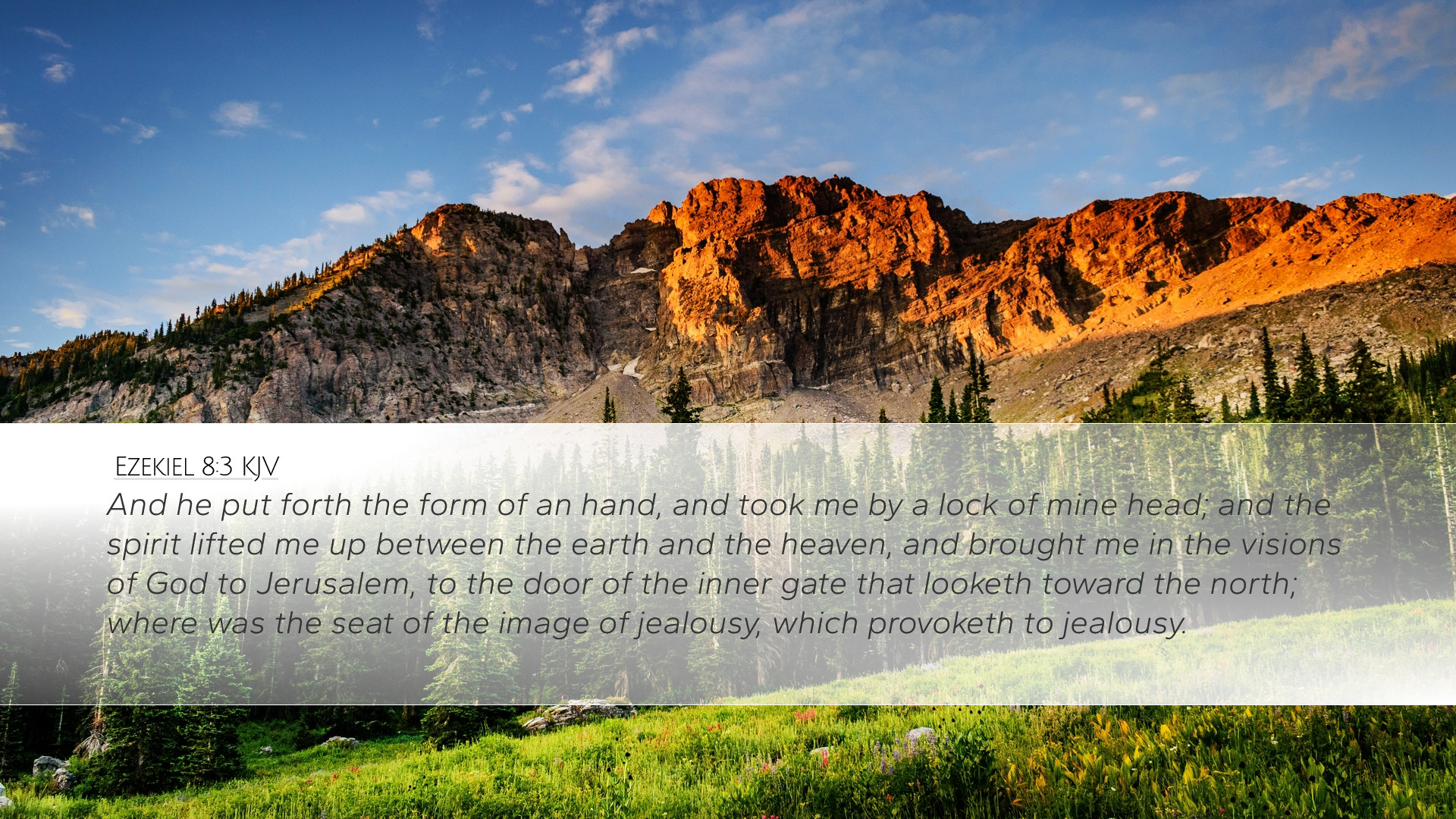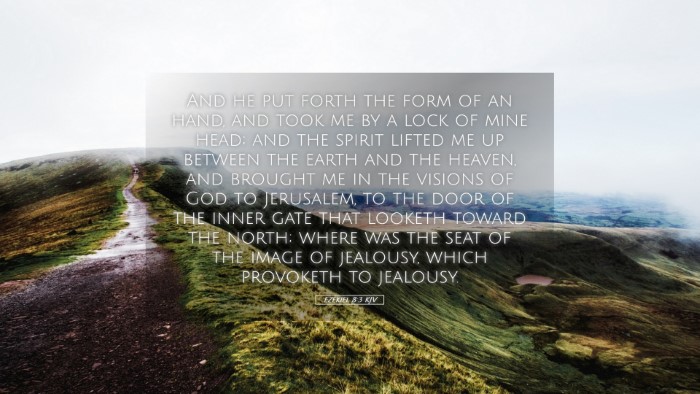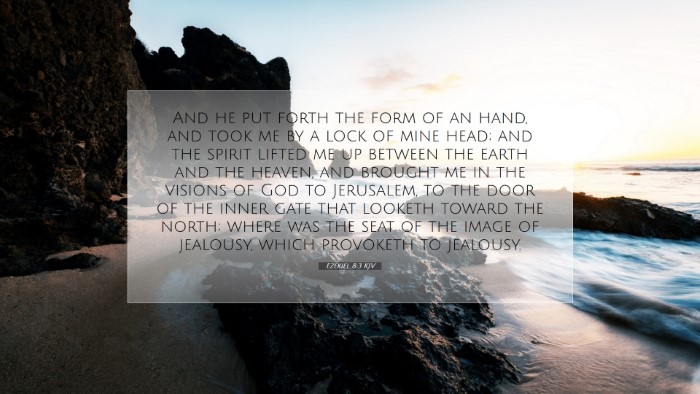Bible Commentary on Ezekiel 8:3
Ezekiel 8:3: "And he put forth the form of a hand, and took me by a lock of mine head; and the Spirit lifted me up between the earth and the heaven, and brought me in the visions of God to Jerusalem, to the door of the inner gate that looketh toward the north; where was the seat of the image of jealousy, which provoketh to jealousy."
Introduction
This verse marks a pivotal moment in Ezekiel's prophetic ministry, characterized by vivid imagery and profound spiritual implications. Ezekiel is transported in a vision to Jerusalem, where he observes the severe idolatry that has taken root among God's people. This commentary will explore the rich insights from several public domain sources to uncover the layers of meaning in this text.
Contextual Background
The book of Ezekiel is situated in a pre-exilic context, where the prophet speaks to a nation in spiritual decline. By the time of this vision, the Israelites are entrenched in idolatry, which is poignantly captured in this verse.
- Historical Context: The Israelites had been exiled to Babylon due to their persistent disobedience to God’s commandments. Ezekiel, called as a prophet, was to communicate God’s messages of judgment and restoration.
- Literary Context: Chapter 8 describes a series of visions. The imagery used invokes strong feelings of betrayal and divine judgment against the backdrop of God’s covenant with Israel.
Interpretation of Key Phrases
- "Put forth the form of a hand": This phrase suggests an element of divine assistance and intervention. Ezekiel's vision begins with the physical manifestation of God’s power manifesting through the hand of God.
- "Lifted me up": Indicating a transformation of perception. The Spirit of God elevates Ezekiel’s understanding, allowing him to perceive the spiritual realities underlying the physical actions of the people.
- "The visions of God": This signifies that what Ezekiel is witnessing is divinely appointed. The nature of these visions connects the prophet with the heart and mind of God regarding Jerusalem’s idolatry.
- "The door of the inner gate": This location is significant as it represents access to the sacred space of the temple. The north gate often symbolizes the entrance to darker practices, inviting idolatry and sin.
- "Image of jealousy": This term reflects God’s response to idolatry. The "image of jealousy" symbolizes God’s rightful anger against the infidelity of His people, who have turned to false gods.
Theological Implications
The theological dimensions of this verse reveal profound insights about God's relationship with His people:
- God’s Divine Authority: The hand of God represents His sovereignty over the situations of humanity. Ezekiel’s being lifted illustrates God’s control and initiative in revealing His plans to His chosen messenger.
- Vision as Revelation: The visions are not mere dreams; they are revelations intended to provoke a response within God’s people. This underscores the seriousness of their sin and the need for repentance.
- Jealousy as a Divine Attribute: The notion of jealousy indicates God’s deep desire for fidelity from His people. It illustrates that idolatry is not just a violation of laws but an affront to personal relationship and love.
Commentary Insights
Matthew Henry on Ezekiel 8:3
Henry emphasizes the gravity of the idolatry seen by Ezekiel, connecting it to the ongoing covenant relationship. He observes how the visual and physical dimensions in this verse represent God’s ways of communicating judgment. Ezekiel’s astonishment and the nature of his transport illustrate the seriousness of the sins occurring in Jerusalem.
Albert Barnes’ Commentary
Barnes focuses on the significance of the location Ezekiel is brought to. The inner gate represents a transition from the outer appearances to the deeper spiritual corruption within the temple. He notes how the image, called the “image of jealousy,” provokes God's holy indignation, making it clear that idolatry directly opposes God's holiness and will.
Adam Clarke's Insights
Clarke delves into the symbolic meaning behind the actions and terms used in this verse. He highlights the importance of the ‘hand’ as a means of divine aid and guidance, serving as a tool for Ezekiel to grasp profound truths about sin and divine judgment. Clarke discusses the 'image of jealousy' as a representation of the absolute betrayal the Israelites committed against God, provoking Him to righteous anger.
Practical Applications
This verse encourages modern readers to reflect on their own spiritual lives concerning idolatry and faithfulness to God:
- Self-examination: Believers are urged to consider areas in their lives that may prioritize false idols over their relationship with God, recognizing that idolatry can manifest in various forms.
- Repentance and Restoration: Just as Ezekiel was given a vision of idolatry, believers today are called to acknowledge sin and seek restoration through genuine repentance.
- Awakening to Divine Reality: The act of being “lifted up” encourages believers to pursue spiritual insights, looking beyond the physical earthly experiences to understand God’s active involvement in the world.
Conclusion
Ezekiel 8:3 serves as a powerful reminder of God's desire for a faithful relationship with His people. The vivid imagery and intense emotions captured in this verse challenge both ancient and contemporary readers alike to examine their hearts, recognize the seriousness of idolatry, and respond to God’s call with humility and faithfulness. Drawing upon the rich commentary from Matthew Henry, Albert Barnes, and Adam Clarke, we gain a multifaceted understanding of this scriptural passage, urging a deeper connection to God amid the distractions of our modern world.


